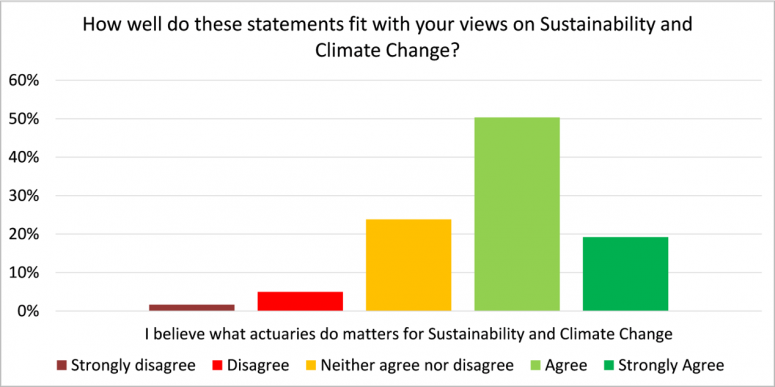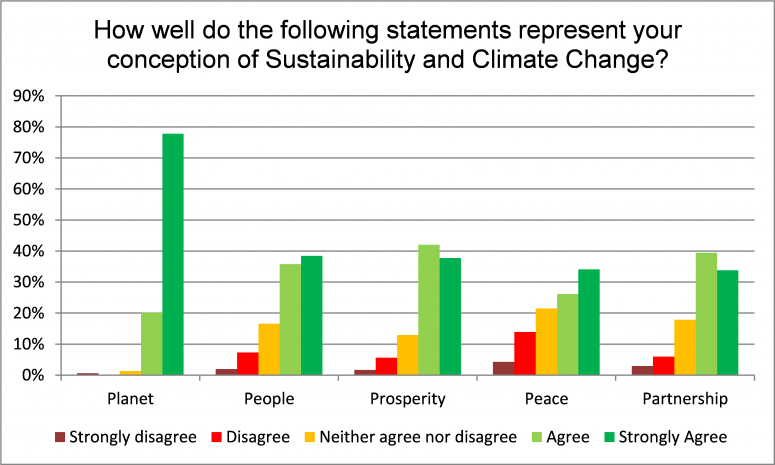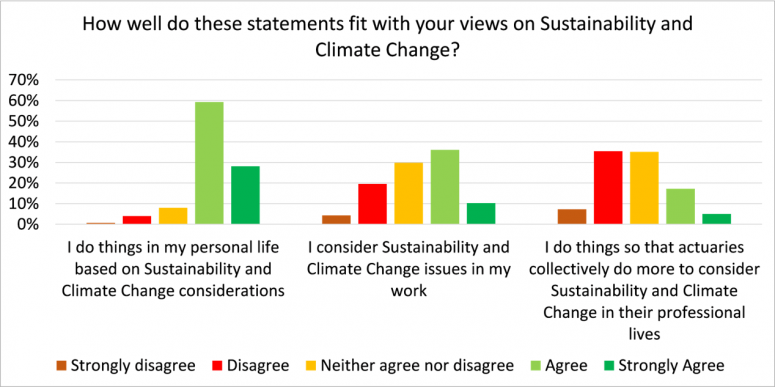Sincere thanks to the nearly 300 people who completed the recent survey to inform the work of the Society and its Sustainability and Climate Change Steering Group. This is a great response and I trust it signals strong interest in the area and its significance for actuaries. It’s hugely encouraging to know that 70% of respondents agree that what actuaries do matters for Sustainability and Climate Change. Only 7% disagree. In the following chart green signals agreement, amber is neutral and red means disagreement.
Within this blog I am deliberately highlighting three provocative high-level findings. Stirring it if you will. Trying to open up debate about what this whole area means for actuaries.
Respondents aren’t joined-up in their conception of sustainability and climate change
To explore the meaning of sustainability and climate change the survey asked for agreement (or disagreement) with a number of assertions. These were based on some statements that are used to summarise the UN’s 2030 Agenda for Sustainable Development (‘2030 Agenda’) to even fewer headings than its 17 Sustainable Development Goals (‘SDGs’). Simply put they are the 5 P’s - Planet, People, Prosperity, Peace and Partnership. You can read them from left to right in the following chart. Green signals respondents in agreement, amber is neutral and red signals disagreement.
There is stronger consensus among respondents to protect the Planet (in their conception of sustainability and climate change) than People, Prosperity, Peace or Partnership. Respondents’ views are their own and to be respected. Nonetheless, some may not appreciate the implications of differences along these dimensions. The whole idea of the SDGs is that solutions to these global problems are mutually interdependent. For example, carbon or methane released anywhere in the world is a problem for SDG 13 Climate Action. Solutions for the Planet need commitment from everyone everywhere. The 193 member states of the UN did just that in 2015 in agreeing the 2030 Agenda. If everyone everywhere is needed to play their part then everyone everywhere needs to feel they will not be left behind in the process. The 2030 Agenda is a delicate compromise to achieve that.
Protecting the Planet is interdependent with other environmental, social and governance issues. This is not a moral judgment but the political reality of forging global agreement. Protecting the Planet requires equally doing things for People, Prosperity, Peace and Partnership. What should the Society do in the light of these survey responses?
Respondents tolerate ambiguities between actions in their personal and work / professional lives
The results of the survey suggest that respondents can compartmentalise their lives when it comes to sustainability and climate change actions. The following chart shows respondents’ level of agreement that specific statements align with their views on sustainability and climate change. Personal life is on the left, work in the middle, the profession on the right. Green means agreement, amber is neutral and red signals disagreement. It is clear to see that most respondents currently take actions in their personal lives but not so much at work and even less so as part of the profession.
Nearly 90% of respondents agree they are taking action in their personal lives but this reduces to fewer than 50% at work and less than 25% professionally. At the same time in answering other questions about 90% of respondents agree with the Society taking action in this area. Do these disconnects feel right?
Respondents aren’t acting on their intuitions unless prompted by regulation
Two of the other questions in the survey explored work in more detail. Responses to one about regulation impacting their work included:
- 15% who are “Familiar with aspects of regulation and directly applying them in my work”, and,
- 5% who are “Working directly on applying the regulatory developments within my role”.
This combined 20% roughly corresponds to the 22% who responded to a separate question saying, “Sustainability and Climate Change risks, including financial risks, are directly relevant to and incorporated in my day to day work”. Therefore, regulation seems to largely explain those doing things directly in their work. However, another 27% of respondents say they “lack the tools or data” and an additional 16% “lack the imperative” to include them, even though they all see these risks could be relevant to their day-to-day work. What should happen next?
Let the debate begin and inform all our actions
If you believe that what actuaries do matters, then please follow through on whatever you can do. The full results of the survey, including any notable differences for different sub-groups of members, will be shared soon. An event will be scheduled shortly. Please join the event, be part of the discussion, have your say on any conflicting signals. Let’s then focus clearly on any calls to action and make the most of our collective influence.
Joe Kennedy
Joe is a member of the Society’s Sustainability and Climate Change Steering Group
Published July 2021
The views of this article do not necessarily reflect the views of the Society of Actuaries in Ireland, the Sustainability and Climate Change Steering Group, or the author’s employer.


